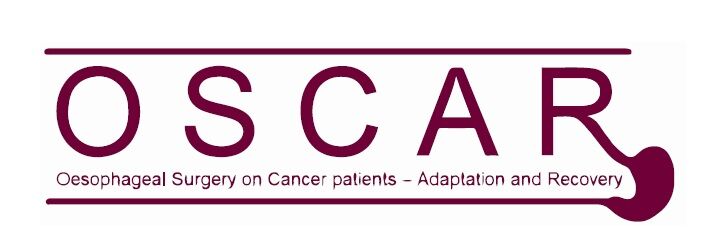OSCAR study
Oesophageal Surgery on Cancer patients - Adaptation and Recovery: OSCAR study

Oesophageal cancer surgery - adaptation and recovery - is a nationwide study that started in 2013 and included patients who have had surgery for oesophageal cancer and their relatives 1 year after the operation (from 2014). Inclusion in the study was closed in June 2021.
Oesophageal cancer
Oesophageal cancer is diagnosed in approximately 450 people in Sweden annually. Due to comorbidity or too advanced tumour at the time of diagnosis only about 25-30% of patients can be offered curative treatment with surgery, often in combination with neoadjuvant oncological therapy. The operation is extensive and takes a long time. There is a high risk of complications in the aftermath that can delay the recovery. Research has shown that many patients suffer from very different symptoms and reduced health-related quality of life long after the operation. Therefore, it is important that patients have a good follow-up with support from different professions based on their needs. However, there is a lack of knowledge about how patients with oesophageal cancer feel about other aspects of their recovery and also how the situation is for their closest relatives.
The purpose of the OSCAR study
The OSCAR study aims to find ways to improve recovery in patients undergoing oesophageal cancer surgery and to identify the needs of their family caregivers.
Participants
All patients in Sweden who have undergone surgery for oesophageal cancer are invited to participate in the study and are contacted 1 year after the operation with a written invitation followed by a telephone call. The patients are identified through contact with the hospitals that operate oesophageal cancer patients, and which have also chosen to help with the study.
Implementation
Patients who choose to participate in the study are asked to include their closest family caregiver. A personal meeting with the patient is booked at their own chosen place (often at home) and an interviewer visits the patient. However, during the Covid-19 pandemic the interviews are conducted by telephone.
Before the visit, a questionnaire is sent out and completed and can be submitted to the interviewer in connection with the meeting. The data collection consists of both questionnaire questions that are answered on a touch screen and open interview questions that are recorded. The meeting takes about two hours. If the patient invites a family caregiver, the family caregiver is invited to answer a questionnaire and will not undergo an interview.
The "Informed Consent" form needs to be signed by each patient and the family caregiver. This form is an assurance that the patient has understood what the purpose of the study is, what it means to participate and that the patient can withdraw from the study at any time. Without a signature, we may not use the questionnaire filled in or obtain supplementary information from Statistics Sweden (socio-economic variables such as demographics, education, income and occupation) and the National Board of Health and Welfare (other diseases, drug use, etc.).
Follow-up
All patients participating in the study will be followed up with a telephone call followed by questionnaires sent at 1½, 2, 2½, 3, 5, 8 and 12 years after the operation. At the 5 year follow up a personal visit is conducted again by the research nurse. The patient's family caregivers are followed up at 1½, 2, 2½, 3 and 5 years.
Volunteering
Participation in the study is completely voluntary and the care and treatment of the patient is not affected if they choose to participate or not and if they choose to withdraw from the study. It is possible to drop out from the study at any time.
The future
The study will form the basis for various measures that will aim to improve recovery for patients with oesophageal cancer. The hope is that, in the future, we will be able to create different tools for healthcare that will allow to adapt follow-up and measures to the needs of oesophageal cancer patients and including their family caregivers.
Contact
If you have questions about the study or if you as a patient have not been contacted and wish to participate in the study, you are welcome to contact our our research nurse Kalle Mälberg.
Kalle Mälberg
Research NurseResponsible researcher: Professor Pernilla Lagergren
